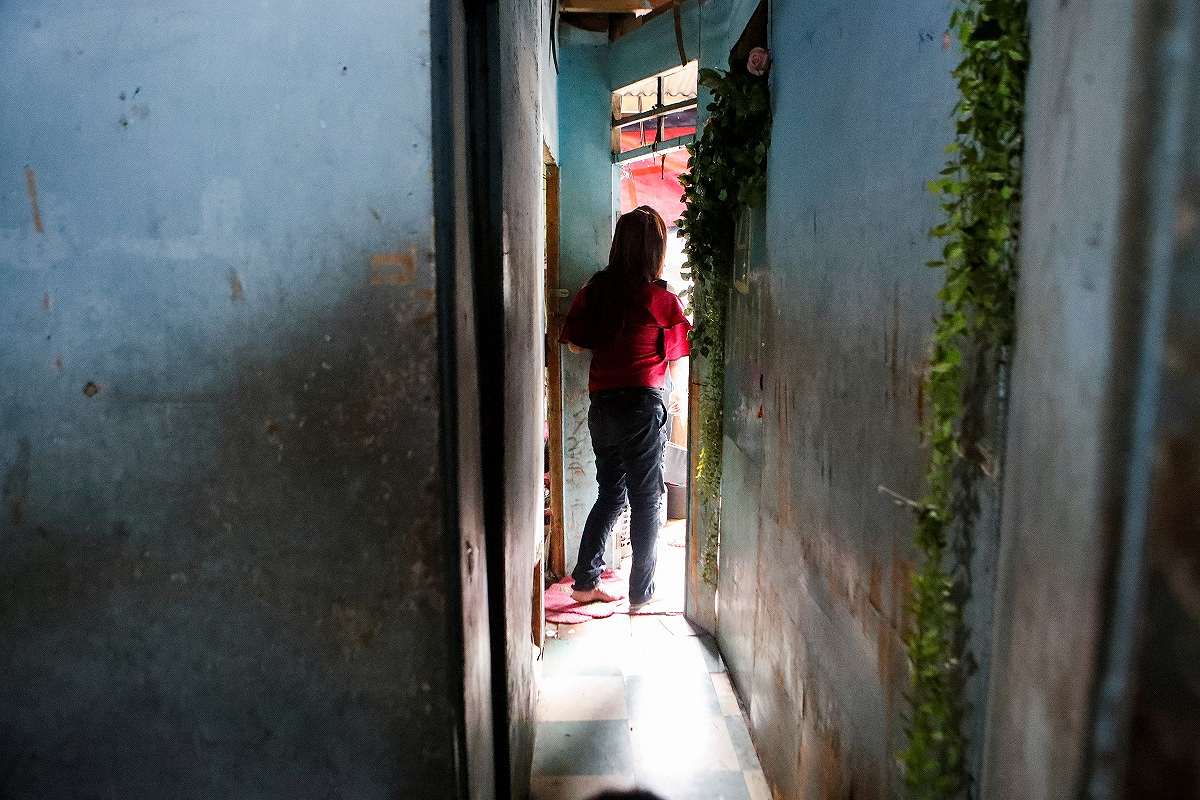
Eva, a 45-year-old trans woman who works as a busker stands near her rented room in Jakarta on Dec. 22.
15:12 JST, January 19, 2023
JAKARTA (Reuters) — Transgender Indonesian woman Chika Ananda Putrie wakes every morning in her decrepit rented room in a Jakarta slum, worried for her safety because of her gender identity.
She saw some of her worst fears come true last month, when the world’s largest Muslim-majority country, and its third-largest democracy, banned people from having sex outside marriage or even living together, at the risk of prison time.
“I am scared of being jailed,” said Chika, a 28-year-old busker who commutes each day to her preferred spot in a nearby town, and fears being caught living with her partner in a country where the government does not recognize gay marriage.
When the legal changes take effect in three years, such unmarried couples, particularly in the LGBT community already under pressure from religious conservatives, will have to contend with the constant threat of being reported to police.
Even though only a spouse, parent or child may report suspected offenses under the new law, experts and rights groups have warned of the risk of misuse by those looking to crush alliances they dislike.
It “will disproportionately impact LGBT people, who are more likely to be reported by families for relationships they disapprove of,” New York-based Human Rights Watch said recently.
The first openly transgender woman to hold public office in Indonesia warned that the law could foster latent homophobia or transphobia while adding risks for those who cannot get married.
“The code does not break the chain of hate,” Hendrika Mayora Victoria Kelan, who is a provincial village official, told Reuters. “The state rules over … people’s bedrooms too much.”
Government officials have said they hope police raids and finger-pointing by moral crusaders would be prevented by the limitations on who is allowed to report a possible offense.
“Other parties cannot report it, or even play judge,” Albert Aries, the spokesperson for a government taskforce on the law, said last month.
“So there will be no legal process without complaints from the rightful party, or those who are directly harmed.”
Officials of the law ministry did not respond to fresh requests for comment.
Traditional views
Although homosexuality is considered taboo in Indonesia, it is not illegal, except in the ultra-conservative, autonomous province of Aceh.
Gender-fluid communities have historically been an accepted part of society. The Bugis ethnic group on Sulawesi island, for instance, traditionally recognizes five genders, including one that is said to “transcend,” or combine, the female and male.
But a rising tide of conservative Islam has swelled persecution of the LGBT community.
“In the last three years there has been an increase in case data every year,” LGBT advocacy group Arus Pelangi said in December, adding that there were more than 90 such incidents last year, up 90% from the previous year.
“It’s possible that the enactment of the criminal code will add to the list of victims from the LGBT community.”
With sexual minorities already living under duress before the new rules, they stand to increase the risk of vigilantism, police raids and abuse of the law, said Bivitri Susanti, an expert from the Indonesia Jentera school of law.
“Their lives will be more threatened because the things that were once considered immoral are now illegal,” she added.
Also fueling concern is a provision on customary law that could lead to some sharia-inspired local laws being replicated elsewhere, reinforcing discrimination against women or LGBT groups.
Like many “waria,” a term combining the words for “woman” and “man” by which transgender women describe themselves, Chika has seen her share of trouble.
Her voice trembled as she told of transgender neighbors unfairly driven out of the slum years earlier, after another neighbor blamed a fire on the mere fact of their existence.
Seated on a mattress beside her partner strumming his guitar in a tenement enlivened by brightly-colored fabrics, Chika said the implications of the new law left her feeling helpless, despite the assurances.
“If anything happens, I’ll just give up,” she said, adding that she would be powerless to resist arrest.
"World" POPULAR ARTICLE
-

8 Japanese Nationals Stranded on Indonesia’s Sumatra Island
-

Mozambican Cooking Class Held in Matsuyama, Ehime Pref.; Participants Don Aprons, Bandanas Made from Traditional Mozambique Fabric
-

China to Impose Sanctions on Shigeru Iwasaki, Former Head of Japan’s Self-Defense Forces, Who Serves as Adviser to Taiwan’s Executive Branch
-

U.S. Senate Resolution Backs Japan, Condemns China’s Pressure
-

South Korea’s Top Court Dismisses Nippon Steel Appeal in Lawsuit over Requisitioned Worker
JN ACCESS RANKING
-

Keidanren Chairman Yoshinobu Tsutsui Visits Kashiwazaki-Kariwa Nuclear Power Plant; Inspects New Emergency Safety System
-

Imports of Rare Earths from China Facing Delays, May Be Caused by Deterioration of Japan-China Relations
-

University of Tokyo Professor Discusses Japanese Economic Security in Interview Ahead of Forum
-

Japan Pulls out of Vietnam Nuclear Project, Complicating Hanoi’s Power Plans
-

Govt Aims to Expand NISA Program Lineup, Abolish Age Restriction



















